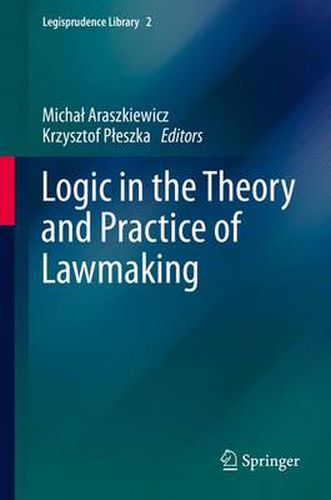Readings Newsletter
Become a Readings Member to make your shopping experience even easier.
Sign in or sign up for free!
You’re not far away from qualifying for FREE standard shipping within Australia
You’ve qualified for FREE standard shipping within Australia
The cart is loading…






This title is printed to order. This book may have been self-published. If so, we cannot guarantee the quality of the content. In the main most books will have gone through the editing process however some may not. We therefore suggest that you be aware of this before ordering this book. If in doubt check either the author or publisher’s details as we are unable to accept any returns unless they are faulty. Please contact us if you have any questions.
This book presents the current state of the art regarding the application of logical tools to the problems of theory and practice of lawmaking. It shows how contemporary logic may be useful in the analysis of legislation, legislative drafting and legal reasoning concerning different contexts of law making.
Elaborations of the process of law making have variously emphasised its political, social or economic aspects. Yet despite strong interest in logical analyses of law, questions remains about the role of logical tools in law making. This volume attempts to bridge that gap, or at least to narrow it, drawing together some important research problems-and some possible solutions-as seen through the work of leading contemporary academics.
The volume encompasses 20 chapters written by authors from 16 countries and it presents diversified views on the understanding of logic (from strict mathematical approaches to the informal, argumentative ones) and differentiated choices concerning the aspects of law making taken into account. The book presents a broad set of perspectives, insights and results into the emerging field of research devoted to the logical analysis of the area of creation of law.
How does logic inform lawmaking?
Are legal systems consistent and complete?
How can legal rules be represented by means of formal calculi and visualization techniques?
Does the structure of statutes or of legal systems resemble the structure of deductive systems?
What are the logical relations between the basic concepts of jurisprudence that constitute the system of law?
How are theories of legal interpretation relevant to the process of legislation?
How might the statutory text be analysed by means of contemporary computer programs?
These and other questions, ranging from the theoretical to the immediately practical, are addressed in this definitive collection.
$9.00 standard shipping within Australia
FREE standard shipping within Australia for orders over $100.00
Express & International shipping calculated at checkout
This title is printed to order. This book may have been self-published. If so, we cannot guarantee the quality of the content. In the main most books will have gone through the editing process however some may not. We therefore suggest that you be aware of this before ordering this book. If in doubt check either the author or publisher’s details as we are unable to accept any returns unless they are faulty. Please contact us if you have any questions.
This book presents the current state of the art regarding the application of logical tools to the problems of theory and practice of lawmaking. It shows how contemporary logic may be useful in the analysis of legislation, legislative drafting and legal reasoning concerning different contexts of law making.
Elaborations of the process of law making have variously emphasised its political, social or economic aspects. Yet despite strong interest in logical analyses of law, questions remains about the role of logical tools in law making. This volume attempts to bridge that gap, or at least to narrow it, drawing together some important research problems-and some possible solutions-as seen through the work of leading contemporary academics.
The volume encompasses 20 chapters written by authors from 16 countries and it presents diversified views on the understanding of logic (from strict mathematical approaches to the informal, argumentative ones) and differentiated choices concerning the aspects of law making taken into account. The book presents a broad set of perspectives, insights and results into the emerging field of research devoted to the logical analysis of the area of creation of law.
How does logic inform lawmaking?
Are legal systems consistent and complete?
How can legal rules be represented by means of formal calculi and visualization techniques?
Does the structure of statutes or of legal systems resemble the structure of deductive systems?
What are the logical relations between the basic concepts of jurisprudence that constitute the system of law?
How are theories of legal interpretation relevant to the process of legislation?
How might the statutory text be analysed by means of contemporary computer programs?
These and other questions, ranging from the theoretical to the immediately practical, are addressed in this definitive collection.